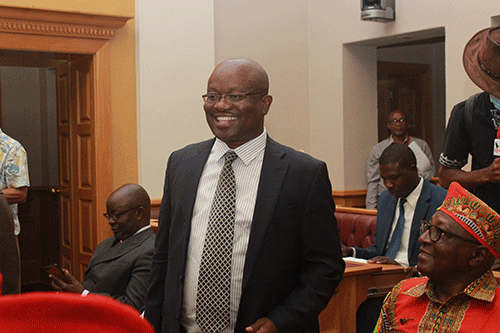Landless People’s Movement (LPM) parliamentarian Henny Seibeb has criticised the information ministry, saying that in the current context, the ministry is a total waste of time.
“Either the two deployed politicians there don’t understand their mandate, or there is a serious misunderstanding about the fourth industrial revolution and rapid industrialisation.
”We should focus on intense efforts to achieve a digital economy that is catalysed by information, communication and technology (ICT). This will result in advanced electronic services, increased productivity and efficiency, as well as increased job creation, particularly for the youth,” Seibeb told parliament last week.
He made this statement in the National Assembly while contributing to the midterm budget review being debated in the August house.
According to Seibeb, ICT is an important tool for innovation and financial inclusion.
“Covid-19 should serve as a lesson to all of us in Africa so we hasten our efforts behind advancing the digital transition. We must implement new plans to move away from a resource-based economy to a knowledge-based economy,” he stated.
Additionally, he called for the acceleration of national digital connectivity, the application of smart technologies to address food security, and the launch of plans to target village connectivity through the provision of high-speed infrastructure to governmental facilities including, but not limited to, schools and health facilities.
Furthermore, Seibeb said Namibia had a National Rural Development Strategy 2013/14-2017/18 (NRDS) to address rural poverty, inequality, unemployment and rural infrastructure development gap.
He said NRDS was supposed to be implemented within the framework of the National Development Plan 4 (NDP4) and the National Rural Development Policy (NRDP), and the estimated cost of the strategy was N$1.53to 6 billion, with N$123 million for coordination and capacity development, N$443 million for rural economic development, N$752 million for social and employment development and N$210 million for planning, environment and climate change.
According to him, over N$100 million was further intended to be provided as credits by the Development Bank of Namibia (DBN), or other development finance institutions through credit line and credit fund arrangements.
However, he said in the absence of any monitoring and evaluation of government programmes, it is difficult to quantify, whether the intended investment was realised and expected outcomes achieved.
“It is important to note that The Integrated Rural Development Programme (IRDP) concept was borrowed from the government of India, as this government launched IRDP in 1978 and implemented it throughout the 1980s,” he said.
He said the aim of the programme was to provide employment opportunities to the poor as well as opportunities to develop their skill sets so as to improve their living conditions.
“The programme is considered one of the best strategies to do away with poverty related problems by offering those who fell below the poverty line the necessary subsidies in tandem with employment opportunities.”


